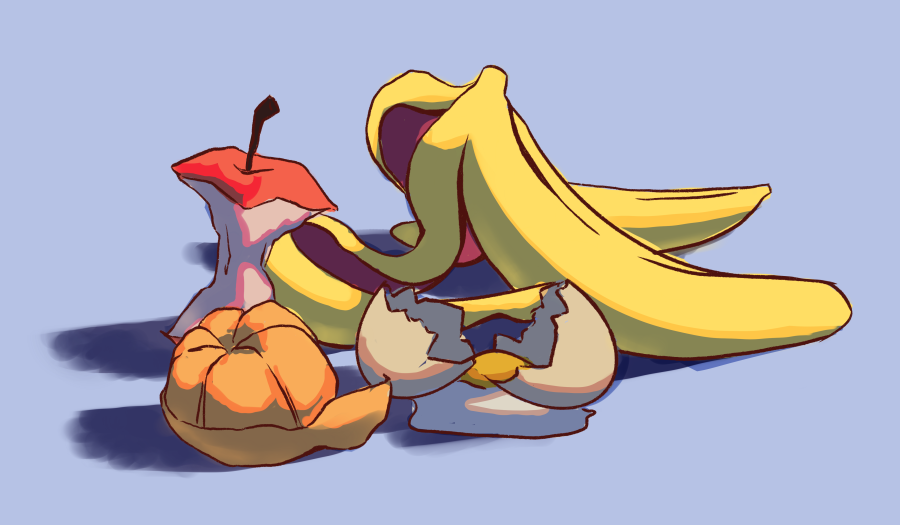As the start date for California’s new composting mandate passes, UCSD students and administrators consider their next steps toward reducing food waste on campus.
According to the Committee on Campus Climate Change (CCCC) July 2021 Food Waste Report, UC San Diego wastes around 1700–2150 tons of food yearly.
Excess food tossed into trash cans is sent to landfills to decompose and emit methane, a harmful gas up to 80 times more toxic than carbon dioxide. This much consumer food waste increases greenhouse gas emissions, which can have a devastating impact on the climate.
In light of California’s new composting mandate, which requires all residents to compost their food waste and organics, UCSD will have to make some changes.
Though there’s a grace period of two years, Calrecycle, a state agency, will evaluate if cities are sufficiently abiding by the new rules and subsequently fine property owners or cities as a whole.
Here at UCSD, both administrators and students are working to promote more sustainable practices with regard to food waste.
Caitlan Frederick is a UCSD graduate and Marine Biology major. During her time at UCSD, she reached out to the chair of the CCCC, Veerabhadran Ramanathan, and became lead author on the 2021 Food Waste Report.
Drawing attention to an issue that felt largely swept under the rug, the Food Waste Report expanded research on the life cycle of food and the impact of its waste on the production of greenhouse gases.
“Before the report, [UCSD] had a [limited] concept of how much food waste was being made,” said Frederick.
UCSD’s 2019 Zero Waste Plan outlines the practices currently in place with regard to composting. UCSD composts its green waste, like landscaping debris, clippings, and wood, as well as pre-consumer food scraps (the material discarded before reaching consumers) from all markets and restaurants run by Housing, Dining, Hospitality (HDH).
Other recommendations outlined in the 2019 Waste Plan include enforcing “green event standards” for events, mitigating unnecessary packaging waste, enforcing their 2018 ban on Styrofoam, and working with the UC system to ban single-use plastics on campus.
UCSD’s next step could examine post-consumer food waste, for which there is currently no system in place.
“Post-consumer” food waste describes the food and organics disposed of after consumer use, including paper napkins, compostable plastics, and food put into trash cans by students in residential areas and dining facilities without compost bins.
UCSD’s waste hauler, EDCO, is a family owned and locally operated waste collection and recycling company. The collective considers mandatory recycling of organic waste an essential step towards reaching its Zero Waste goals.
EDCO proposes their new anaerobic digestion facility as a solution to food waste. Anaerobic digestion is “a process through which bacteria break down organic matter,” according to the EPA.
The UCSD campus is actually home to two on-site anaerobic digesters. Despite two recent reports (the 2019 Zero Waste Plan and 2021 Food Waste Report) encouraging the idea, neither digester is in use.
The use of anaerobic digesters will depend on UCSD’s collection of post-consumer waste. Because the school has not begun this process, EDCO does not yet collect its post-consumer food waste.
UCSD faced a number of issues in attempting to transform their composting systems, some listed in their 2019 Zero Waste Plan.
One hurdle is the “competition for space,” because priority is given to academic and research buildings, on-campus housing, etc. Space for on-site sorting and self hauling is difficult to find. UCSD’s capacity to create effective organic waste systems is further complicated by a lack of regional organics recycling infrastructure.
Dawn Cox, UCSD’s environmental coordinator, works with sustainability staff on ideas and goals to achieve UCSD’s 90% Zero Waste goal. Cox explained why UCSD has not begun to use their on-campus anaerobic digesters.
“Our go-live [for the anaerobic digestion system] was supposed to be October of 2020, and then we just ran into some issues with staffing and logistics of how to get all the different areas into one place in order to haul it,” Cox said.
In order to use the digesters, UCSD would need containers and compactors for a large number of facilities on campus.
Cox said UCSD was planning to put green waste cans in Price Center common areas beginning the week of Jan. 23. Throughout the week, students would act as peer educators to help direct others as to where to put their food. Bins would be collected and audited daily by EDCO, making sure there wasn’t any contamination.
After one week of this process, educational signs would replace peer educators. From there, EDCO would compare results and evaluate the success and plausibility of the project on a bigger scale.
Unfortunately, the project halted due to remote learning, though a new start date is in the works. Cox pointed out that it would actually be a big commitment to leave compost bins unattended.
“Are we really ready to put out open cans and trust that everybody knows the process?” Cox asked.
If UCSD is to install compost bins and begin composting post-consumer waste to send to anaerobic digesters, they’ll need the resources and staff to conduct education programs and training to ensure proper use of compost.
Cox hopes that they can begin use of the anaerobic digesters in the next six months. She also noted that in the next 90–120 days, facilities will actually begin to compost paper towels from bathrooms.
An informational video on the Zero Waste page informs students of the importance of properly disposing of food waste, explaining that until EDCO begins collecting UCSD’s post-consumer waste, students can bring their compost to student gardens around campus.
These locations include Ellie’s Garden, Marshall Community Garden, Roger’s Urban Farmlab and Warren Grow. Student gardens are currently the best compost options for students residing on campus, although there is a limit to the amount of waste they can take in.
UCSD’s website actually hosts a large variety of resources promoting and encouraging sustainability on campus. The Staff Sustainability Collective website includes links to events, programs, and ways to get involved at UCSD. They also provide guides on how to host sustainable or zero waste events and consider your own impact through a personal waste audit.
They hosted a number of events to educate the community on sustainability, recycling, and approaching a zero waste lifestyle. All of these sites and guides serve as effective resources to educate students on how they can compost and be more sustainable, but do students even know about them?
Shaylee Prelewicz, an Earl Warren College junior, is double majoring in environmental systems and anthropology. As director of energy and waste for the Student Sustainability Collective (SSC), Prelewicz has worked to educate and lead students towards a zero-waste lifestyle.
An essential part of this zero waste lifestyle is understanding how to compost. Prelewicz feels that the biggest battle with regard to composting at UCSD is the lack of education and accessible information.
“The campus could be more vocal about how students can get involved in composting,” Prelewicz said.
Cox described different ways that she’d like to expand outreach, including informational booths around campus, signs to help students throw waste into the correct places, and equipping new student orientations with information about composting.
Both Prelewicz and Frederick agreed that requiring students to learn about composting on campus serves as one of the most effective ways to get people involved.
In the 2021 Food Waste Report, the UCSD Academic Senate suggests incentivizing a “zero food waste mindset” on campus. Frederick describes a mindset in which students examine their food consumption, working to understand where it came from and where it will go when disposed of.
Students can implement this mindset into their daily lives through a host of different actions, including saving their leftovers, getting food from the gardens or food pantries, and making stock out of vegetable waste and meat bones. A student with a zero waste mindset will do everything they can to prevent their food from becoming waste in the first place.
“You’re repurposing those unwanted parts of food and giving them one more use before they have to go in the trash,” Frederick said. “We want to eliminate food waste from even becoming food waste.”
Reducing the sources that generate waste is what can really make a difference. Prelewicz noted a similar sentiment, suggesting that students consider changing their lifestyle in even the smallest ways, like choosing not to purchase single-use plastics anymore.
“The little things that you can do as a student might not seem like much, but it really does make a difference,” Prelewicz said.
The creation of new composting operations on campus involve significant costs; it isn’t inexpensive to hire their off-site haulers, nor install composters and hire people to conduct transports and education programs.
Frederick and Prelewicz agreed that students are the best stakeholders to push for change, both in their lives and through pressuring administration into making much needed changes.
According to Frederick, student demands and opinions could lead to structural changes at UCSD.
“I feel like a lot of the big changes I’ve seen have been a result of students reaching out and urging campus to make change,” Prelewicz said.
Even if students don’t have the time or opportunity to compost their food, Frederick encourages them to take even just a moment to appreciate where it came from.
“Remember that so much work went into your food to get to your plate. People had to pick it, ship it, cool it, put a little wax layer or container around it, someone had to sell it, you had to buy it. Make the most of it. Why should its life cycle have to end in the landfill?” Frederick told The UCSD Guardian.
Art by Nicholas Regli for The UCSD Guardian.
















Noritz • Feb 23, 2022 at 8:26 am
Hello! Thank you for the article!
The campus sets the trend in a very good direction. If for a separate residential building or apartment the disposal of food waste is problematic, then for a hostel, also with anaerobic boilers, this is a very reasonable step. This is both fertilizer for the land and savings on garbage transportation.